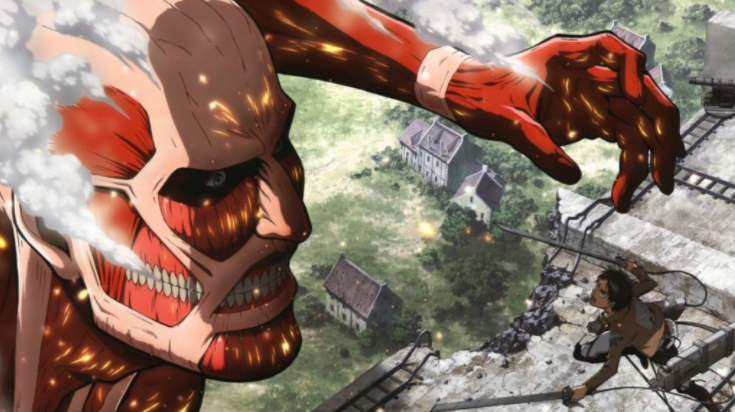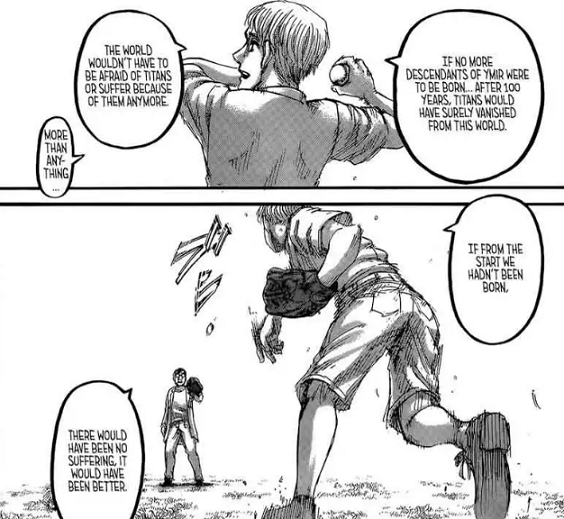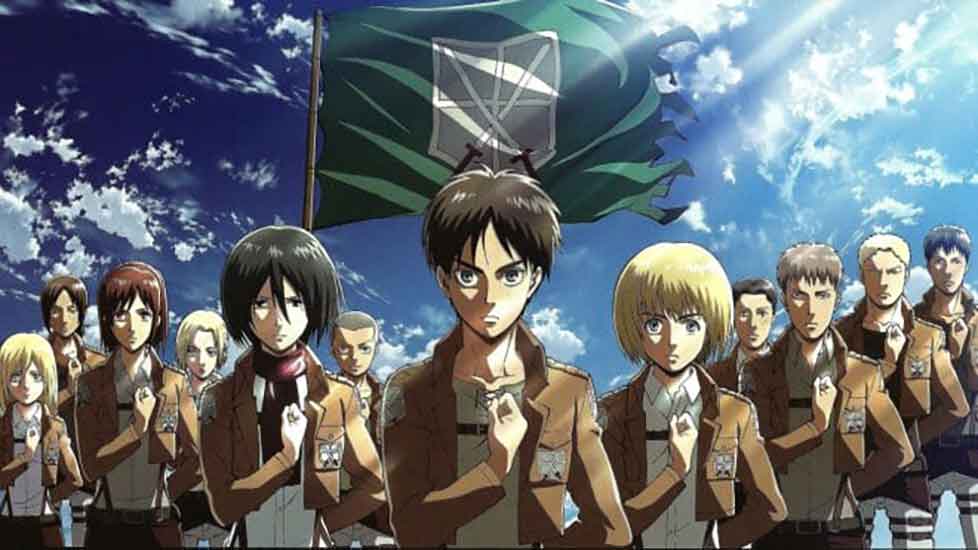By Penny Theodorakopoulou,
It was April 7th, 2013. A new anime called Attack on Titan (進撃の巨人, Shingeki no Kyojin) was aired in a plethora on anime fans’ screens. From the first episode, the creator of AoT, Hajime Isayama, wanted to captivate both fans of anime and manga, who had already read the anime’s first chapters since 2009 — and he successfully fulfilled his goal. To this very day, AoT is considered one of the most popular and highly-rated anime of all time — and for a good reason. In fact, the release of AoT’s final season, Shingeki no Kyojin: The Final Season Part 2, was considered the most anticipated anime of the year, since its last cliffhanger a year ago (March 29th, 2021). The only reason AoT is not the most anticipated anime of the year is that the first two episodes of the final season have already been released (January 9th & 16th), already counting down its end, since the final season is confirmed to consist of 12 episodes.
The plot of AoT
But what exactly is AoT, you might ask? Allow me to answer your question, whilst trying to remain as spoiler-free as possible — at least for the time being. Humanity was being threatened by Titans for hundreds of years, but thanks to the current king and the three walls that are sealing humans (Wall Maria, Wall Rose, and Wall Sina), peace has been kept for over 100 years. However, in the year 845, Titans return and attack Shiganshina, Wall Maria, bringing havoc and manslaughtering. Our protagonist, Eren Jaeger, watching his own mother being eaten in front of him by a female Titan, swears to himself to avenge the death of his mother and kill every single Titan. In order to do that, however, he needs to join the Survey Corps, a task force that goes on expeditions with the sole purpose of exterminating as many Titans as possible, while gaining knowledge on them, as well as exploring the rest of the world — without success. However, the Survey Corps has a secret weapon in their hands that they are unaware of… at least for the time being.
From this point on, you are reading at your own risk!

Eren finds out that he is a Titan himself, giving hope to humanity for the first time in a hundred years to bring an end to Titans’ oppression. The first three seasons (excluding the second part of the Third Season) show the Survey Corps’ attempts to exterminate Titans and get intel about them. Eren’s father, Grisha Jaeger, has given Eren the key to his basement back in Shiganshina, where every answer regarding the Titans would be answered there. So, in Shingeki no Kyojin Season 3 Part 2, the Survey Corps begin the sealing of the Wall Maria Operation, in order to have access to Dr. Jaeger’s basement. After humanity’s first successful mission, but with numerous deaths of fellow soldiers, Eren and his companions head to the basement only to find the terrible truth about the world: that everything they once knew, was based on a lie. The reality is that they are Eldians, staunch opponents of the victorious Marleyans, who were encircled by the walls when King Fritz left the fight. They are not, as they were informed, the last humans, but rather a secluded sect of Eldians on the remote island of Paradis. The Eldians are still subjugated by Marley because they are “Subjects of Ymir” who can be converted into Titans by being injected with spinal fluid. The Survey Corps kills all of the remaining Titans behind the walls and makes it to the shore, where Eren wonders if they will truly be free if they defeat all of their foes.
Zeke Jaeger’s “euthanasia plan”
Young Zeke had a strange mixture of his parents’ pro-Eldian viewpoints and his grandparents’ anti-Eldian ones. This mixed into Zeke’s mind a contradicting sympathy for the Eldian plight and an understanding of the Marleyan hatred towards Eldians, the “Subjects of Ymir”. To Zeke, the problem was not that Eldians were oppressed and needed to be saved or that Marleyans were right to hate and fear Eldians in the first place. According to his point of view, the problem lies in the never-ending war between Marleyans and Eldians, and something had to be done so there would finally be peace. Once Zeke found out about the Founding Titan’s ability (to control other Titans through its scream), he came up with the “euthanasia plan”, as he calls it. When young Zeke was given this information, the plan he came up with to end the suffering of his people was to… end his people. Zeke’s “euthanasia plan” is to make every Eldian sterile so that their suffering will come to an end and the world will be able to move on. For this plan to work, all he really needs is his brother to get on board. We should note that for the Founding Titan’s abilities to activate, one of the following conditions must be met: one, the holder of the Founding Titan is of royal blood, like all the previous rulers of Paradis Island; or two, if the holder of the Founding Titan is not of royal blood, they can have any sort of physical contact, activating the Founding Titan’s abilities. Since Eren has the Founding Titan and Zeke is of royal blood, the two of them could work together to make sure this is the last generation of Eldians.
The morality in Zeke’s “euthanasia plan”
Zeke is basically arguing that if his people, Eldians, had never been born, they never would have had to experience so much oppression and suffering. So naturally, if he could sterilize all of his people, they would slowly cease to exist and could no longer pose a threat to others or be victims themselves. This touches on a debate currently taking place in philosophy, ethics, and environmental studies: antinatalism. Simply put, antinatalism is the belief that procreation and bringing human lives into existence is morally wrong. As far as antinatalists are concerned, one’s parents did something objectively unethical when they had that person. Sophocles wrote: “Never to have been born as best but if we must see the light, the next best is quickly returning whence we came”. We must specify that Zeke’s antinatalism is specific to his people and this is different from contemporary antinatalism, which is universal in its scope and applies to all of humanity. In the show, however, the belief that kids should not be born to suffer gets applied to a specific group of people: Eldians.

David Benatar, a South African philosopher and the most notable contemporary antinatalist thinks sparing humans from suffering is one of the key arguments for bringing the circle of life to a hard stop. In his book, Better Never to Have Been: The Harm of Coming into Existence, he argues that: “While good people go to great lengths to spare their children from suffering, few of them seem to notice that the one (and only) guaranteed way to prevent all the suffering of their children is not to bring those children into existence in the first place”. He takes the type of argument that Zeke is using to defend Eldian antinatalism and uses it to argue that existence as such creates unnecessary suffering for humans who never asked to come into existence in the first place. To put it simply and in a syllogism:
S1: All humans suffer.
S2: All children suffer.
C: Why make children suffer?
Conclusion
We should clear out that forced sterilization is nothing like killing other people. In fact, considering the Earth’s current condition, Zeke’s “euthanasia plan” does not sound like a bad idea — just like some Marvel fans might agree with Thanos’s plan to exterminate exactly 50% of the universal population was a noble act of his. The way I see it, as long as there is no eugenics involved, which AoT was quite close in swimming into these waters, forced sterilization is considered quite controversial. Suffering for both Eldians and Marleyans will eventually end with Eldians not being born anymore. However, in a parallel universe that Titans were indeed real and that humanity was truly oppressed by their continuous domination for hundreds of years. Will the suffering ever end? From the known history, we know that humans will always find an excuse to go to war and cause harm. For more information regarding AoT, do yourself a favor and watch it — it is never too late.

In the next part, we will discuss Eren Jaeger’s viewpoint in regard to one of the oldest and most controversial philosophical arguments: freedom. Until then, shinzou wo sasageyo (心臓を捧げよ)! Give your hearts!
References
- Attack on Titan, wikipedia.org, Available here
- The Twisted Philosophy of Zeke Jaeger (Attack on Titan Explain), youtube.com, Available for watching here
- The Philosophy Of Zeke Yeager | Attack on Titan (Shingeki no Kyojin), youtube.com, Available for watching here
- Plato’s “Republic” and Attack on Titan, redcarline.medium.com, Available here
- Life without the Will to Life: Zeke’s Epiphany, tumblr.com, Available here




